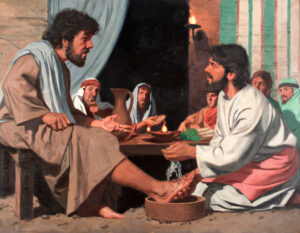Daily Lesson for Sunday 1st of December 2024
The farewell discourse (John 13:1-38; John 14:1-31; John 15:1-27; John 16:1-33; John 17:1-26) provides instruction for Jesus’ disciples concerning the future. Its literary pattern is similar to Moses’ farewell in Deuteronomy or Jacob’s blessing his children (Genesis 47:1-31; Genesis 48:1-22; Genesis 49:1-33) or David’s instructing Solomon (1 Chronicles 28:1-21; 1 Chronicles 29:1-30). Jesus consoles His disciples regarding His departure. He promises a surrogate to represent Him (the Holy Spirit; John 14:1-31; John 15:1-27; John 16:1-33). He predicts grief to come (John 15:1-27; John 16:1-33), and He exhorts the disciples to stay faithful (John 15:1-27).
Read John 13:1-20. What happened here, and why is this story so important? What lessons did Jesus seek to teach?
In that part of the world in Jesus’ day, people wore sandals or went barefoot. The feet would become dusty and dirty. It was a custom for a servant or slave to wash the feet of those coming to a meal. But no servant was present for this function on the night Jesus ate His last meal with His disciples before His arrest.
To everyone’s surprise, Jesus Himself arose from the supper and washed all of their feet. John 13:4-5 tells Jesus’ actions step by step. It is told in such detail to emphasize the Master’s doing this unbelievable act of humility.
By telling about Peter’s response, John 13:8-11 deepens the sense of dismay and incomprehension of the disciples at Jesus’ actions. How could Jesus, the Master, the Messiah, be doing such a lowly task? Peter refused to allow Jesus to wash his feet, only to be told by Jesus that if he did not cooperate, he would have no part with Jesus. Then Peter asked for more, expressing his desire to be connected with Jesus all the way.
The significance of Jesus’ action is tied to who He is. He states in John 13:13 that He is the Teacher and the Lord. That is what they called Him, and He indicates that it is so. These titles express authority and power.
Yet, Jesus teaches that power and authority are to be used for service, not for self-aggrandizement. The Adventist Church has embraced this sense of Jesus’ example, taking what is rightly called the Ordinance of Humility as a preparatory service for the Lord’s Supper.
|
What does the Ordinance of Humility teach you about following in the footsteps of Jesus and how to humbly serve others? |
 (0)
(0)Source: https://ssnet.org/blog/24d-10-i-have-given-you-an-example/




